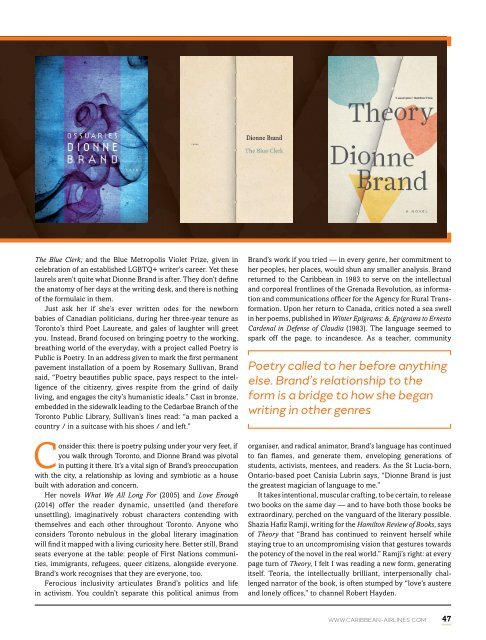Caribbean Beat — September/October 2019 (#159)
A calendar of events; music, film, and book reviews; travel features; people profiles, and much more.
A calendar of events; music, film, and book reviews; travel features; people profiles, and much more.
Create successful ePaper yourself
Turn your PDF publications into a flip-book with our unique Google optimized e-Paper software.
The Blue Clerk; and the Blue Metropolis Violet Prize, given in<br />
celebration of an established LGBTQ+ writer’s career. Yet these<br />
laurels aren’t quite what Dionne Brand is after. They don’t define<br />
the anatomy of her days at the writing desk, and there is nothing<br />
of the formulaic in them.<br />
Just ask her if she’s ever written odes for the newborn<br />
babies of Canadian politicians, during her three-year tenure as<br />
Toronto’s third Poet Laureate, and gales of laughter will greet<br />
you. Instead, Brand focused on bringing poetry to the working,<br />
breathing world of the everyday, with a project called Poetry is<br />
Public is Poetry. In an address given to mark the first permanent<br />
pavement installation of a poem by Rosemary Sullivan, Brand<br />
said, “Poetry beautifies public space, pays respect to the intelligence<br />
of the citizenry, gives respite from the grind of daily<br />
living, and engages the city’s humanistic ideals.” Cast in bronze,<br />
embedded in the sidewalk leading to the Cedarbae Branch of the<br />
Toronto Public Library, Sullivan’s lines read: “a man packed a<br />
country / in a suitcase with his shoes / and left.”<br />
Consider this: there is poetry pulsing under your very feet, if<br />
you walk through Toronto, and Dionne Brand was pivotal<br />
in putting it there. It’s a vital sign of Brand’s preoccupation<br />
with the city, a relationship as loving and symbiotic as a house<br />
built with adoration and concern.<br />
Her novels What We All Long For (2005) and Love Enough<br />
(2014) offer the reader dynamic, unsettled (and therefore<br />
unsettling), imaginatively robust characters contending with<br />
themselves and each other throughout Toronto. Anyone who<br />
considers Toronto nebulous in the global literary imagination<br />
will find it mapped with a living curiosity here. Better still, Brand<br />
seats everyone at the table: people of First Nations communities,<br />
immigrants, refugees, queer citizens, alongside everyone.<br />
Brand’s work recognises that they are everyone, too.<br />
Ferocious inclusivity articulates Brand’s politics and life<br />
in activism. You couldn’t separate this political animus from<br />
Brand’s work if you tried <strong>—</strong> in every genre, her commitment to<br />
her peoples, her places, would shun any smaller analysis. Brand<br />
returned to the <strong>Caribbean</strong> in 1983 to serve on the intellectual<br />
and corporeal frontlines of the Grenada Revolution, as information<br />
and communications officer for the Agency for Rural Transformation.<br />
Upon her return to Canada, critics noted a sea swell<br />
in her poems, published in Winter Epigrams: &, Epigrams to Ernesto<br />
Cardenal in Defense of Claudia (1983). The language seemed to<br />
spark off the page, to incandesce. As a teacher, community<br />
Poetry called to her before anything<br />
else. Brand’s relationship to the<br />
form is a bridge to how she began<br />
writing in other genres<br />
organiser, and radical animator, Brand’s language has continued<br />
to fan flames, and generate them, enveloping generations of<br />
students, activists, mentees, and readers. As the St Lucia-born,<br />
Ontario-based poet Canisia Lubrin says, “Dionne Brand is just<br />
the greatest magician of language to me.”<br />
It takes intentional, muscular crafting, to be certain, to release<br />
two books on the same day <strong>—</strong> and to have both those books be<br />
extraordinary, perched on the vanguard of the literary possible.<br />
Shazia Hafiz Ramji, writing for the Hamilton Review of Books, says<br />
of Theory that “Brand has continued to reinvent herself while<br />
staying true to an uncompromising vision that gestures towards<br />
the potency of the novel in the real world.” Ramji’s right: at every<br />
page turn of Theory, I felt I was reading a new form, generating<br />
itself. Teoria, the intellectually brilliant, interpersonally challenged<br />
narrator of the book, is often stumped by “love’s austere<br />
and lonely offices,” to channel Robert Hayden.<br />
WWW.CARIBBEAN-AIRLINES.COM<br />
47

















